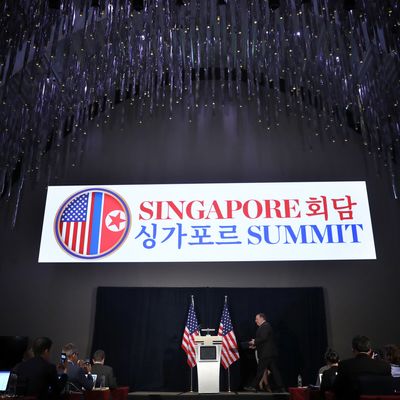
Donald Trump has decided to leave his historic summit with Kim Jong-un 15 hours earlier than expected, flying back to Washington on Tuesday night instead of Wednesday morning. The White House says that this change of plans is a product of talks moving more quickly than expected. But there’s reason to suspect that it is because they are barely moving at all.
On Monday evening in Singapore, Secretary of State Mike Pompeo told reporters that complete denuclearization “is the only outcome that the United States will accept” from Pyongyang, and that the latter will enjoy no economic relief until it has met that demand. By contrast, Pompeo did suggest that the U.S. was prepared to make unspecified concessions to North Korean security concerns before the total dismantling of its nuclear program was achieved.
“We’re prepared to take actions that will provide them sufficient certainty that they can be comfortable that denuclearization isn’t something that ends badly for them,” Pompeo said, adding that talks were “moving quite rapidly and we anticipate they will come to their logical conclusion even more quickly than we had anticipated.”
Talks rapidly reaching their “logical conclusion” has been a feature of the past few weeks of diplomacy between Washington and Pyongyang. On May 30, Pompeo met with North Korean spy chief Kim Yong-chol in New York; their discussion concluded two hours earlier than expected, as Kim refused to make any commitment whatsoever on denuclearization, according to the Washington Post. Days earlier, in the North Korean village of Panmunjom, negotiations between diplomats from Washington and Pyongyang stalled when North Korea’s vice–foreign minister Choe Son-hui said that denuclearization “should not be on the table for the Singapore summit” — a demand that would nullify the meeting’s purpose from the White House’s perspective.
Now, both sides appear prepared to let Tuesday’s historic face-to-face between the sitting leaders of the U.S. and North Korea function as more of an ice-breaker (and photo op) than a high-stakes diplomatic showdown. “We are hopeful this summit will have set the conditions for future successful talks,” Pompeo said during his remarks Monday.
The summit will open at 9 a.m. Tuesday in Singapore (which is 9 p.m. tonight in Washington) with Kim and Trump shaking hands and taking a walk in the view of the media, according to an official who spoke with Bloomberg News. The two leaders will then meet one on one (with only translators listening in), before being joined by their top aides. Among those flanking Trump will be Pompeo and national security adviser John Bolton, whose belligerent rhetoric toward North Korea briefly derailed the summit last month.
For the moment, it is difficult to see how the American and North Korean positions can be reconciled. For Pyongyang, the summit is itself an affirmation of its nuclear program immense value. It is inconceivable that the world’s leading superpower would make time for an isolated, impoverished Chinese client state if said state did not have weapons of mass destruction. In leveraging the threat of its nuclear program, by contrast, Kim’s regime has secured Washington’s ostensible endorsement of its right to violate human rights in perpetuity.
Given the tangible benefits of retaining its nuclear weapons; the dearth of reasons to trust America’s promises; the high likelihood that Washington isn’t actually willing to risk a mass-casualty war to force denuclearization; and the fact that one of North Korea’s chief security demands — the withdrawal of American troops from the region — is something that Trump has suggested that he wants to do regardless, for “America first” reasons, it is hard to understand why Pyongyang would ever commit to total denuclearization.
Granted, North Korea has other security goals that America could facilitate — among them, a guarantee to defend its regime against domestic challenge, a peace treaty ending the Korean War, and the removal of South Korea and Japan from America’s so-called nuclear umbrella. But the White House is insisting that it will make no major concessions on these fronts until Pyongyang has dismantled its nuclear program.
If the two sides’ long-term, strategic objectives appear incompatible, however, their short-term political goals would seem to be in close alignment: Both leaders have an interest in declaring the summit a productive first step in an ongoing process. After the debacle at the G7, Trump does not want to come home without a symbolic display of diplomatic skill; and a friendly summit will do more to legitimate Kim’s regime than a failed one.
It doesn’t take all that long to reach an agreement to disagree for now, and talk more later. If that is the “logical conclusion” of the summit in Singapore, then it’s unsurprising that the two sides are converging on it “rapidly.”






























